-
Iran’s skyrocketing stock exchange signals historic political shift
In Iran, this spring brings a historic opportunity for neoliberal opposition parties personified by President Rouhani. The utopian dream will now get its first chance to prove itself as a cash-starved Islamic Republic embarks on its boldest ever embrace of privatization of state-owned companies.
-
NATO returns to Libya to challenge Russia
The great game in Libya has begun surging with the United States shedding its strategic ambivalence and resorting to a proactive role. At the end of May, the Pentagon marked a dramatic escalation by accusing Moscow of bolstering “Kremlin-linked mercenaries” who are allegedly helping Khalifa Haftar, the eastern warlord in Libya.
-
How many dead Yemenis does it take to equal one Washington Post contributor?
The War Nerd dissects reporting on Saudi Arabia to show how the corporate media cares more about a dead Washington Post columnist than a quarter of a million Yemenis killed in a Western-backed war.
-
How Russia is botching its alliance with Syria
Russia’s relationships with its client states have never been easy. Of course, managing client states is always a complicated exercise. The Kremlin’s cupboard is full of skeletons—Hungary (1956), Czechoslovakia (1968), Cuba (1962), Afghanistan (1980), Ukraine (2014) and so on.
-
Facebook deactivates dozens of accounts of Palestinian journalists and activists
At least 52 Palestinians have been affected by Facebook’s deactivation sweep, according to data collected by Middle East Eye
-
Syria spinmeisters fumble attempts to narrative manage OPCW leaks
It’s been over 72 hours since The Grayzone published new leaks further exposing how the Organisation for the Prohibition of Chemical Weapons (OPCW) has been lying about its investigation into an alleged chemical attack in Douma, Syria two years ago.
-
Don’t threaten Afghans—it will be counterproductive
The principal deputy assistant secretary at the Bureau of South and Central Asian Affairs (SCA) in the U.S. State Department, Alice Wells, dropped a bombshell on the Afghan government and the country’s political elites on April 4—and caught the international donors by surprise, too—by linking all aid to Afghanistan to the formation of an inclusive government in Kabul.
-
Has America reached its endgame in Afghanistan?
In an extraordinary statement titled “On the Political Impasse in Afghanistan,” Washington has admitted to the failure of Secretary of State Mike Pompeo’s mission to Kabul on March 23, which was taken up to heal the political rift among Afghan politicians and to urge them to form an inclusive government so as to implement the peace agreement signed in Doha on February 29.
-
Why sanctions against Iran and Venezuela during a pandemic are cruel
In the midst of a pandemic, one would expect all countries to collaborate; that a humanitarian crisis of this magnitude would provide ample opportunity to end (or suspend) inhumane economic sanctions. Is this not the time for the imperialist bloc, led by the U.S., to end the sanctions against Cuba, Iran, Venezuela, and a series of other countries?
-
12 ways the U.S. invasion of Iraq lives on in infamy
While the world is consumed with the terrifying coronavirus pandemic, on March 19 the Trump administration will be marking the 17th anniversary of the U.S. invasion of Iraq by ramping up the conflict there.
-
United States Imposed Economic Sanctions: The Big Heist
The money trail of U.S. Sanctions leads to the Federal Reserve Bank of New York, which—behind the shadow of secrecy laws that effectively prohibit any form of public accountability—facilitates the theft of public wealth from targeted countries on a scale only previously accomplished through military invasion and occupation.
-
Israel hits a brick wall
Elections are supposed to solve problems by reordering government, adopting new policies, and putting new people in control. But how many elections must Israel have before it realizes it can do none of those things because it’s caught in an intractable constitutional bind?
-
Lebanon state prosecutor blocks order to freeze assets of 20 banks
Lebanon’s state prosecutor suspended an order on Thursday to freeze the assets of 20 local banks, warning it would plunge the country and its financial sector into chaos, according to a copy of the decision seen by Reuters.
-
Lebanon is a severe case of subordinate financialization that must avoid the IMF
To me, the Lebanese crisis looks like, in the first instance, as a foreign exchange and international transactions crisis, a classic developing country crisis in the era of financialisation. As such it is closely connected to the country’s policy on the exchange rate. The fixed peg policy chosen by the Lebanese ruling class and operated by the central bank and the government for a long time, has proven destructive. The country’s economy is under great pressure because the strong pound has damaged Lebanese competitiveness on an international scale and facilitated the growth of domestic credit.
-
The prospect of peace in Afghanistan is real—and Pakistan is the key player
The U.S.-Taliban peace agreement signed in Doha on February 29 must be put in proper perspective. Indeed, there can’t be two opinions that the curtain is coming down on what U.S. President Donald Trump called the “endless war” in which America squandered away over a trillion dollars and lost thousands of lives with no victory in sight. Equally, without a doubt, this is the finest hour of Pakistan’s statecraft since the country’s creation in 1947.
-
Witnessing the hell that a migrant can face
The Saudi-UAE war on Yemen has been going on for five years. Despite recent peace talks leading to an improvement in aid distribution, the violence has escalated in certain key districts of Yemen over the past two weeks. Since January, 35,000 Yemenis have been displaced from their homes, an indicator of the dangerous situation in the country.
-
Is the World about to witness the end of the war in Afghanistan?
Neither the Indian political leadership nor the “deep state” seems to grasp that the geopolitics of the South Asian region is transforming with far-reaching consequences.
-
U.S. uneasy as Iraq gets new prime minister
The protest movement in Iraq, which is now entering its fourth month, has come to be the principal instrument for Washington to surreptitiously advance the broader geopolitical confrontation with Iran that is being played out within the country.
-
Libya is being torn apart by outsiders
Ghassan Salamé is the head of the United Nations Support Mission in Libya. He took over this job in 2017, six years after the catastrophic NATO war on Libya. What Salamé inherited was a country torn into shreds, two governments in place—one in Tripoli and one in Tobruk—and one civil war that had too many factions to name.
-
U.S. deploys “usable” nuclear weapon amid continuing war threats against Iran
The Pentagon deployed a new, smaller nuclear warhead aboard the ballistic missile submarine USS Tennessee as it sailed into the Atlantic last month in the midst of the spiraling crisis with Iran. The weapon, known as the W76-2 warhead, has an explosive yield of roughly five kilotons, a third of the destructive power of the “Little Boy” bomb that claimed the lives of some 140,000 people in Hiroshima in 1945.


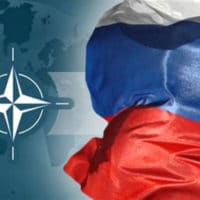
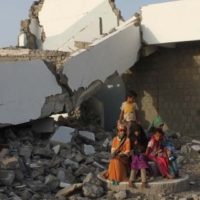
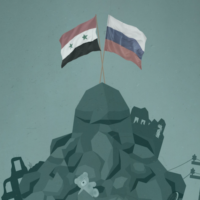

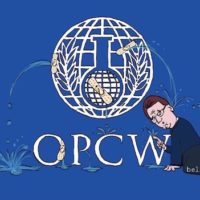
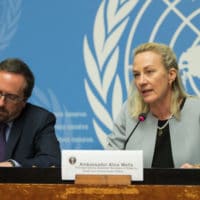
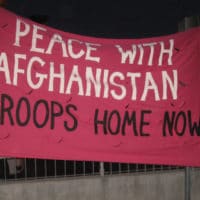
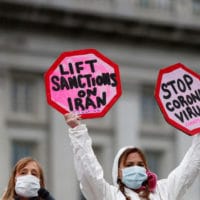

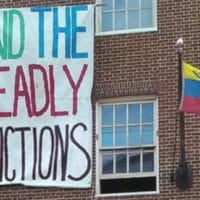


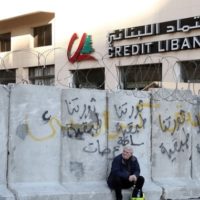
![Secretary of State Michael R. Pompeo participates in a signing ceremony in Doha, Qatar, on February 29, 2020. [State Department photo by Ron Przysucha/ Public Domain]](https://mronline.org/wp-content/uploads/2020/03/peace-signing-200x200.jpg)


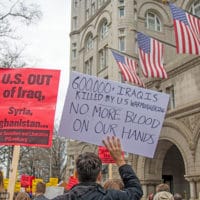

![The new weapon has been rolled out with remarkable speed. The Trump administration’s 2018 Nuclear Posture Review called for the development of “a low-yield SLBM [submarine-launched ballistic missile] warhead to ensure a prompt response option that is able to penetrate adversary defenses” and close “an exploitable ‘gap’ in US regional deterrence capabilities.” The pretext for the warhead’s deployment was the unsubstantiated claim that Russia is developing similar weapons and has adopted a doctrine of “escalate to de-escalate” or “escalate to win” by utilizing low-yield nuclear weapons, with the expectation that Washington would not retaliate with strategic warheads for fear of initiating an all out thermonuclear war. The Pentagon’s argument has been that a low-yield and rapid reaction ballistic missile is needed to “restore deterrence.” The report by the FAS strongly suggests, however, that this alleged Russian doctrine is a pretext and that “it is much more likely that the new low-yield weapon is intended to facilitate first-use of nuclear weapons against North Korea or Iran.” It points out that both the US National Security Strategy and the Nuclear Posture Review (NPR) envision the use of nuclear weapons in response to “non-nuclear attacks, and large-scale conventional aggression,” and that the NPR explicitly stated that the W76-2 warhead was designed to “expand the range of credible US options for responding to nuclear or non-nuclear strategic attack.” Washington does not rule out a nuclear strike, including against non-nuclear armed countries like Iran. The deployment of the USS Tennessee with its new “usable” nuclear warheads came at roughly the same time as President Donald Trump huddled with his top aides on December 29 at his Mar-a-Lago resort in Florida, ordering the criminal drone missile assassination of Gen. Qassem Suleimani, one of Iran’s top officials. The drone killing was carried out at Baghdad’s international airport five days later. In a report Thursday, NBC News, citing unnamed senior US officials, established that at the same meeting in Florida, “Trump also authorized the bombing of Iranian ships, missile launchers and air defense systems... Technically, the military can now hit those targets without further presidential authorization, though in practice, it would consult with the White House before any such action.” The report warned that “the two sides remain in a dangerous boxer’s clench, in which the smallest miscalculation, some officials believe, could lead to disaster.” In other words, for all the talk of war having been averted following the act of war and war crime carried out by Washington in the murder of Suleimani, the reality is that the world remains on the knife’s edge of a catastrophic military confrontation, which could rapidly escalate into the first use of nuclear weapons in three-quarters of a century. The threat against Iran is part of a far broader buildup to global war through which US imperialism is seeking to offset the erosion of its previously hegemonic domination of the global economy by resorting to the criminal use of overwhelming military force. After securing a $738 billion military budget for 2020 with the support of an overwhelming majority—Democratic and Republican alike—in the US Congress, the Trump administration is now preparing to push through a 20 percent increase in the budget for the National Nuclear Security Administration (NNSA), the agency overseeing the buildup of the US nuclear arsenal. This $20 billion budget proposal, made public this week, represents only a fraction of the more than $1 trillion the US is projected to spend on “modernizing” the arsenal over the next three decades—plans that were set into motion under the Democratic administration of Barack Obama, before Trump took office. Trump is a war criminal. His threats to carry out the “obliteration” of Iran and to rain “fire and fury” upon North Korea are not merely hyperbole. The “usable” nuclear weapons to commit such atrocities have already been placed in his hands. As the Senate impeachment trial of the US president limps to an ignominious close, it is striking that Trump’s greatest crimes, including acts of war and his threat to drag the world into a nuclear war, feature in no way in the charges against him. On the contrary, the articles of impeachment center on allegations that he withheld lethal military aid to Ukraine and has been insufficiently aggressive in confronting Russia. This charge is made, as Newsweek pointed out this week, after the Pentagon staged an unprecedented 93 separate military exercises between May and the end of September of last year, all of them simulating or preparing for war against Russia. This includes practice bombing runs less than 500 miles from the Russian border and the steady build-up of ground forces in the three Baltic states and Poland, together with escalating US air deployments described as “bomber assurance” and “theater security” programs. The drive to war has its source not in the diseased mind of Donald Trump, but rather in the insoluble crisis of global capitalism. There exists no antiwar faction within the US ruling class, including its Democratic representatives, only tactical differences over how US imperialist interests should best be pursued on the global arena. The struggle against a new imperialist world war and the threat it poses to the survival of humanity can be based only upon the struggles of the working class, which is engaged in a wave of strikes and social upheavals across the planet. These emerging mass struggles must be armed with a socialist and internationalist program to unify workers in the common fight to put an end to the source of war and social inequality, the capitalist system.](https://mronline.org/wp-content/uploads/2020/02/First-launch-of-a-Trident-missile-on-January-18-1977-at-Cape-Canaveral-Florida-Credit-U.S.-Navy-file-photo-200x200.jpg)